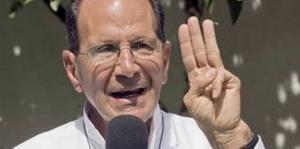Alejandro Solalinde is a Catholic priest who runs a shelter in southern Mexico for migrants—mostly Central Americans—who are crossing the country on their way to the United States. For his efforts he has received both plaudits and death threats. Last Wednesday, May 16, the militant anti-violence group, Movement for Peace with Justice and Dignity (MPJD), sent him this letter:
 Dear Alejandro Solalinde,
Dear Alejandro Solalinde,
We have learned of the trip you will take in the coming days to tell the world of the terrible situation of migrants passing through Mexico. We wish you success.
We have also learned that you have had to move up the date of your trip because of the death threats against you that have increased over the past few days. How absurd and sad it is that in our Mexico we can’t protect the lives of people like you who defend life and who struggle against injustice and impunity. Even worse, [your case] shows us that—by their actions or omissions—some governments are involved in the attacks against defenders of human rights and journalists committed to the truth.
From here, dear Solalinde, we wish to reiterate all our affection, solidarity and admiration. You know that you are not alone, and that each step you take we, the members of MPJD, take with you. We also want you to know that we are following the investigations into these threats and that we will bring pressure and raise our voices as much as necessary so that on your return you can continue your work of accompaniment of the migrants without risk.
Solalinde, who founded the Hermanos en el Camino migrant shelter in the southern state of Oaxaca, decided to leave the country for at least six weeks at the suggestion of Mexican Bishops, international human rights organizations, and many of his political supporters.
Amnesty International announced it had learned that that a professional hit man had been contracted to kill Solalinde. The Hermanos en el Camino shelter issued a formal statement saying that the activist priest was "protecting his physical safety" until the threats were thoroughly investigated. "International human rights organization that work closely with Solalinde suggested he go away for a while," one of the coordinators of the work at the shelter told the press.
While state and federal prosecutors investigate the case, Solalinde, indicated that the death threats against him came from groups at the service of “influential politicians” and drug traffickers. He laid responsibility at the feet of former Oaxaca governor Ulises Ruiz for any aggression against him or any member of his team. Ruiz is well known for the extreme violence he unleashed against striking schoolteachers and their supporters six years ago in Oaxaca city.
On October 15, just before leaving the country, Solalinde held a press conference in which he said, “if anything happens to me or to our team I would blame Ulises Ruiz, but he is not the only one. That is why I demand that the authorities undertake a complete investigation of the case. Throughout his term in office I was constantly attacked.” A well-intention administration may now be in office in Oaxaca, he continued, but “the apparatus of Ulises is still intact.”
Upon leaving Mexico Solalinde granted an interview in Miami to the Spanish-language television chain Univisión. Asked if he wanted to identify the politicians behind the death threats, he said, “right now they are investigating who they are,” adding that he had learned that the price on his head was five million pesos (about $400 thousand dollars). Asked whether he thought the threats came from politicians or drug traffickers, he replied that an honest investigation (in Oaxaca) would show that there was almost no difference between the two. “I would like to see [such an investigation] happen but I don’t have much hope that they will undertake one.” The shelter has been opposed, he said, by “powerful interests, economic interests, drug-trafficking interests, but also by uncomfortable politicians accustomed to corruption.”
He held up a small notebook that contained, he told Univision’s viewers, the names of people who might want to take his life. “It’s all written down,” he said.
For more from Fred Rosen's blog, "Mexico, Bewildered and Contested," visit nacla.org/blog/mexico-bewildered-contested.

